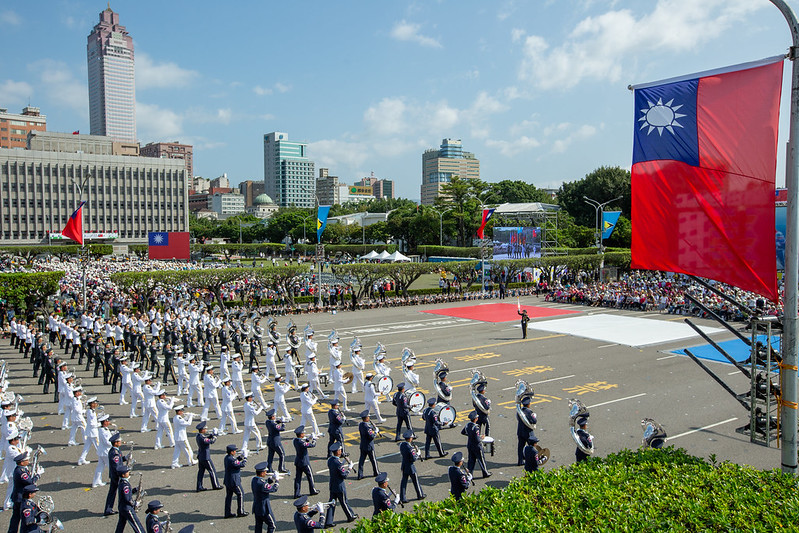Governing Taiwan is never going to be easy, and as expected, support for the Tsai administration has dropped since May 20. We detail which issues, from cross-Strait relations to matters pertaining to people’s livelihood, weigh the most in the public’s mind.
More than a year has passed since Tsai Ing-wen’s historic electoral victory, and despite high initial support commensurate with a landslide victory, her approval ratings have noticeably declined. According to Taiwan Indicators Survey Research, Tsai’s approval ratings fell by over 20 percentage points from 70 percent in May of 2016 (the month of her inauguration) to 45.5% in August. Additional surveys suggest roughly a third of respondents approved of Tsai’s performance to date (see here, here, and here). While Tsai’s declining popularity is neither unusual for presidents (see here, here, and here for comparative perspectives), nor has it translated into support for the Kuomintang (KMT), the question remains what factors are influencing perceptions of Tsai’s presidency.
President Tsai’s policy challenges can be broadly separated into cross-Strait and domestic policy arenas. As expected, Tsai received a cool reception from Beijing compared with its willingness to engage her predecessor Ma Ying-jeou, in no small part due to her avoiding a reaffirmation of the “1992 Consensus.” China claims the so-called consensus affirms Taiwan’s status as part of an otherwise ambiguously interpreted “one China,” but ignores how Taiwan’s democratization makes such a commitment, made in the absence of the democratic Progressive Party (DPP), untenable now. More broadly, President Tsai remains committed to the “status quo” on Taiwan’s status, a position of which most Taiwanese are supportive. China’s apparent willingness to end the so-called diplomatic truce further puts pressure on the Tsai administration to engage in a foreign policy that could exacerbate tensions with China.
Tsai’s approval ratings fell by over 20 percentage points from 70 percent in May of 2016 (the month of her inauguration) to 45.5% in August.
Ma was a proponent of strengthening cross-Strait relations and was the first Taiwanese president to meet in person with a Chinese president; however, no offer of such a meeting with President Xi Jinping followed Tsai’s victory. Warmed cross-Strait relations under Ma led to increased economic integration, culminating with the Economic Cooperation Framework Agreement (ECFA). In contrast, one of Tsai’s election platforms was to decrease Taiwan’s economic dependence on China, for example with the New Southbound Policy, policies consistent with the DPP’s historical positions. However, to what extent Tsai can balance the competing economic demands of diversifying trade with the incentives for focusing on the Chinese market is uncertain a year into her administration. Nor are these tensions new. For example, despite a political cold shoulder from Beijing and similar desires to diversify trade under the Chen Shui-bian administration (2000-2008), exports to China increased roughly sevenfold.
Furthermore, Taiwanese defense spending has not matched the escalating security threat as China continues its military modernization, a longstanding concern of Taiwan’s sole arms supplier, the United States. Tsai proposed increasing the military for both security and economic benefits, and Taiwan is expected to see military expenditures rise to 3 percent of GDP next year.
The proposed increase in military spending would presumably signal Tsai’s commitment to national defense, but in light of rising cross-Strait tensions, such signaling may be a double-edged sword, contributing to Tsai’s declining approval ratings, especially among those who do not identify with the DPP.
The home front
Others have argued that domestic issues are the root of Tsai’s falling numbers. For example, although unemployment is trending downward (see here and here), other economic issues such as sluggish GDP growth, rising income inequality, slowing exports, and declining domestic industries have potentially further damaged Tsai’s popularity. Tsai inherited a weak economy with just 0.7 percent growth in 2015, and while Taiwan is likely to see improved economic growth in 2017, it is still likely to be under 2 percent. This will provide challenges throughout Tsai’s presidency as economic growth was front and center during her election campaign. Tsai campaigned on several economic policies such as the “Asian Silicon Valley Development Plan,” but implementation of such policies remains limited. If her administration is not able to address economic concerns, she is likely to see growing discontent across Taiwan regardless of partisanship.
The administration’s efforts to tackle a myriad of other domestic issues — from the legalization of same-sex marriage to pension reform and transitional justice — also provide potential fodder for opponents across the political spectrum. For example, during the election period Tsai strongly supported several progressive issues, including same-sex marriage. This issue seemed less divisive at the time of the election, but as the process for attaining legalization stretches on, organized backlash from conservatives and Christians to proposed legalization has become more noticeable. Tsai reiterated her support for same-sex marriage at the beginning of December 2016, but her meetings with those on both sides of the issue in February further led credence to claims that her administration sought to stall its passage. While Tsai may be seeking to find some form of a middle ground, the delay risks undermining support among those who expected legalization shortly after the DPP garnered its first legislative majority.
However, it remains unclear which of the many international and domestic policy areas has the greatest impact on perceptions of Tsai’s performance to date. Survey data from National Chengchi’s Election Study Center provides additional insight. The recently released 18th wave of the “Taiwan’s Election and Democratization Study” (TEDS2016_PA12), available here, rather than relying on one measure of evaluation, asks a series of questions to evaluate President Tsai’s performance. For example, one question asks respondents to grade Tsai’s leadership on a zero to 10 scale, with high scores indicating stronger leadership. Overall, respondents gave Tsai a lukewarm evaluation (5.23), with predictably higher evaluations from those who identify with the DPP (6.77) compared to supporters of the KMT (3.97). An additional question on evaluating Tsai’s morality on the same zero to 10 scale finds a similar distinction (DPP: 7.82; KMT 5.18; overall: 6.35). More importantly for our purposes, the survey also asks respondents if they are satisfied with Tsai’s overall performance as well as satisfaction of her performance in five substantive areas: cross-Strait relations, diplomacy, national defense, economic development and livelihood issues. For simplicity, we combine those who claimed to be very satisfied or satisfied for a simple binary measure of satisfaction for the figure below.
Partisan divisions
Here clear variation is apparent across the five measures. More importantly, the partisan division in perceptions is undeniable: those who identify with Tsai’s DPP consistently stated their satisfaction with Tsai’s performance at rates four times greater or more than their KMT counterparts. The deviation is most clear in regards to cross-Strait relations, where nearly three-quarters of DPP identifiers (72.91%) were satisfied with cross-strait relations compared with only 5.11% of KMT identifiers.

That partisanship influences public perceptions of elected officials is not a surprise. However, the more specific questions, such as the first five in the figure above, gives us some insight into which policy areas more directly influence general evaluations of Tsai’s leadership and “morality.” Admittedly, we would expect some correlation among these measures, especially for partisans. In other words, perceptions of the individual policy areas are unlikely to be viewed by citizens, especially those with a strong partisan identification, in isolation from one another. Nevertheless, answers to these survey questions provide a means to further parse out the influence of overall evaluations.
We ran a series of regressions to identify which of the five factors weighed more heavily on broader evaluations of Tsai. Furthermore, through regression analysis we could control for partisan identification (including for parties beyond the DPP and KMT) as well as demographic factors (age, gender, education). By doing so, we found that all five factors positively correlated with evaluations of Tsai and that the findings did not fundamentally change based on what outcome variable (or dependent variable in social science terminology) we used, from overall performance to leadership to morality. However, which of the five mattered more differs in noteworthy ways.
Perceptions of cross-Strait relations remain salient in regards to presidential evaluations, yet individual positions on this are tied largely to longstanding divisions in partisan identification.
Evaluations of Tsai’s performance on cross-Strait relations had the largest influence on models using overall performance as the outcome to explain. However, evaluation of Tsai on livelihood issues generated the largest influence in models using the leadership or morality scores as the outcome. It is also worth noting that the survey also asked which policy area should be Tsai’s priority, with nearly half (45.54%) stating economic development and 16.46% stating cross-Strait relations. Less than 1 percent (0.31%) explicitly stated livelihood issues, although admittedly other answers within the survey could fall within this broad category. This finding suggests that how voters gauge their satisfaction of Tsai is not completely in line with the issues they think she should be tackling.
Although the usual suspects in influencing perceptions of presidents in Taiwan remain influential, our findings suggest greater attention should be placed on the importance of livelihood issues. For example, perceptions of cross-Strait relations remain salient in regards to presidential evaluations, yet individual positions on this are tied largely to longstanding divisions in partisan identification. Meanwhile, positions on the livelihood issues are likely less fixated on traditional fault partisan lines. That livelihood issues produced such a strong finding may also be due to the term encompassing a broad range of smaller but often overlooked issues. Regardless, the findings suggest means to improve Tsai’s approval ratings that do not require the cooperation of Beijing. In sum, the evidence of the importance of livelihood issues further illustrates that “all politics is local.”
Top photo courtesy of the Tsai Ing-wen official Facebook page.
You might also like
More from Taiwan Politics
Candidate Claims ‘Nobody Loves Taiwan More Than Xi Jinping’
Family business connections in the Pingtan free-trade zone and a son’s involvement with the CPPCC are raising questions about possible …
Above All, The Legitimacy of Taiwan’s Democracy
Since democratization, the main political parties in Taiwan have agreed to rules of the game which have served to legitimize …
Trouble in the Blue Camp
Within a matter of months, Han the savior has turned into a liability, and a bit of an embarrassment, for …









